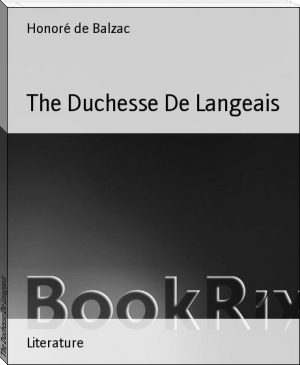The Thirteen by Honoré de Balzac (book club books .txt) 📖

- Author: Honoré de Balzac
Book online «The Thirteen by Honoré de Balzac (book club books .txt) 📖». Author Honoré de Balzac
Nevertheless, Jules submitted to the demands of the world, knowing that, sooner or later, a family has need of it; but he and his wife felt themselves, in its midst, like green-house plants in a tempest. With a delicacy that was very natural, Jules had concealed from his wife the calumny and the death of the calumniator. Madame Jules, herself, was inclined, through her sensitive and artistic nature, to desire luxury. In spite of the terrible lesson of the duel, some imprudent women whispered to each other that Madame Jules must sometimes be pressed for money. They often found her more elegantly dressed in her own home than when she went into society. She loved to adorn herself to please her husband, wishing to show him that to her he was more than any social life. A true love, a pure love, above all, a happy love! Jules, always a lover, and more in love as time went by, was happy in all things beside his wife, even in her caprices; in fact, he would have been uneasy if she had none, thinking it a symptom of some illness.
Auguste de Maulincour had the personal misfortune of running against this passion, and falling in love with the wife beyond recovery. Nevertheless, though he carried in his heart so intense a love, he was not ridiculous; he complied with all the demands of society, and of military manners and customs. And yet his face wore constantly, even though he might be drinking a glass of champagne, that dreamy look, that air of silently despising life, that nebulous expression which belongs, though for other reasons, to _blases_ men,--men dissatisfied with hollow lives. To love without hope, to be disgusted with life, constitute, in these days, a social position. The enterprise of winning the heart of a sovereign might give, perhaps, more hope than a love rashly conceived for a happy woman. Therefore Maulincour had sufficient reason to be grave and gloomy. A queen has the vanity of her power; the height of her elevation protects her. But a pious _bourgeoise_ is like a hedgehog, or an oyster, in its rough wrappings.
At this moment the young officer was beside his unconscious mistress, who certainly was unaware that she was doubly faithless. Madame Jules was seated, in a naive attitude, like the least artful woman in existence, soft and gentle, full of a majestic serenity. What an abyss is human nature! Before beginning a conversation, the baron looked alternately at the wife and at the husband. How many were the reflections he made! He recomposed the "Night Thoughts" of Young in a second. And yet the music was sounding through the salons, the light was pouring from a thousand candles. It was a banker's ball,--one of those insolent festivals by means of which the world of solid gold endeavored to sneer at the gold-embossed salons where the faubourg Saint-Germain met and laughed, not foreseeing the day when the bank would invade the Luxembourg and take its seat upon the throne. The conspirators were now dancing, indifferent to coming bankruptcies, whether of Power or of the Bank. The gilded salons of the Baron de Nucingen were gay with that peculiar animation that the world of Paris, apparently joyous at any rate, gives to its fetes. There, men of talent communicate their wit to fools, and fools communicate that air of enjoyment that characterizes them. By means of this exchange all is liveliness. But a ball in Paris always resembles fireworks to a certain extent; wit, coquetry, and pleasure sparkle and go out like rockets. The next day all present have forgotten their wit, their coquetry, their pleasure.
"Ah!" thought Auguste, by way of conclusion, "women are what the vidame says they are. Certainly all those dancing here are less irreproachable actually than Madame Jules appears to be, and yet Madame Jules went to the rue Soly!"
The rue Soly was like an illness to him; the very word shrivelled his heart.
"Madame, do you ever dance?" he said to her.
"This is the third time you have asked me that question this winter," she answered, smiling.
"But perhaps you have never answered it."
"That is true."
"I knew very well that you were false, like other women."
Madame Jules continued to smile.
"Listen, monsieur," she said; "if I told you the real reason, you would think it ridiculous. I do not think it false to abstain from telling things that the world would laugh at."
"All secrets demand, in order to be told, a friendship of which I am no doubt unworthy, madame. But you cannot have any but noble secrets; do you think me capable of jesting on noble things?"
"Yes," she said, "you, like all the rest, laugh at our purest sentiments; you calumniate them. Besides, I have no secrets. I have the right to love my husband in the face of all the world, and I say so,--I am proud of it; and if you laugh at me when I tell you that I dance only with him, I shall have a bad opinion of your heart."
"Have you never danced since your marriage with any one but your husband?"
"Never. His arm is the only one on which I have leaned; I have never felt the touch of another man."
"Has your physician never felt your pulse?"
"Now you are laughing at me."
"No, madame, I admire you, because I comprehend you. But you let a man hear your voice, you let yourself be seen, you--in short, you permit our eyes to admire you--"
"Ah!" she said, interrupting him, "that is one of my griefs. Yes, I wish it were possible for a married woman to live secluded with her husband, as a mistress lives with her lover, for then--"
"Then why were you, two hours ago, on foot, disguised, in the rue Soly?"
"The rue Soly, where is that?"
And her pure voice gave no sign of any emotion; no feature of her face quivered; she did not blush; she remained calm.
"What! you did not go up to the second floor of a house in the rue des Vieux-Augustins at the corner of the rue Soly? You did not have a hackney-coach waiting near by? You did not return in it to the flower-shop in the rue Richelieu, where you bought the feathers that are now in your hair?"
"I did not leave my house this evening."
As she uttered that lie she was smiling and imperturbable; she played with her fan; but if any one had passed a hand down her back they would, perhaps, have found it moist. At that instant Auguste remembered the instructions of the vidame.
"Then it was some one who strangely resembled you," he said, with a credulous air.
"Monsieur," she replied, "if you are capable of following a woman and detecting her secrets, you will allow me to say that it is a wrong, a very wrong thing, and I do you the honor to say that I disbelieve you."
The baron turned away, placed himself before the fireplace and seemed thoughtful. He bent his head; but his eyes were covertly fixed on Madame Jules, who, not remembering the reflections in the mirror, cast two or three glances at him that were full of terror. Presently she made a sign to her husband and rising took his arm to walk about the salon. As she passed before Monsieur de Maulincour, who at that moment was speaking to a friend, he said in a loud voice, as if in reply to a remark: "That woman will certainly not sleep quietly this night." Madame Jules stopped, gave him an imposing look which expressed contempt, and continued her way, unaware that another look, if surprised by her husband, might endanger not only her happiness but the lives of two men. Auguste, frantic with anger, which he tried to smother in the depths of his soul, presently left the house, swearing to penetrate to the heart of the mystery. Before leaving, he sought Madame Jules, to look at her again; but she had disappeared.
What a drama cast into that young head so eminently romantic, like all who have not known love in the wide extent which they give to it. He adored Madame Jules under a new aspect; he loved her now with the fury of jealousy and the frenzied anguish of hope. Unfaithful to her husband, the woman became common. Auguste could now give himself up to the joys of successful love, and his imagination opened to him a career of pleasures. Yes, he had lost the angel, but he had found the most delightful of demons. He went to bed, building castles in the air, excusing Madame Jules by some romantic fiction in which he did not believe. He resolved to devote himself wholly, from that day forth, to a search for the causes, motives, and keynote of this mystery. It was a tale to read, or better still, a drama to be played, in which he had a part.
CHAPTER II. FERRAGUS
A fine thing is the task of a spy, when performed for one's own benefit and in the interests of a passion. Is it not giving ourselves the pleasure of a thief and a rascal while continuing honest men? But there is another side to it; we must resign ourselves to boil with anger, to roar with impatience, to freeze our feet in the mud, to be numbed, and roasted, and torn by false hopes. We must go, on the faith of a mere indication, to a vague object, miss our end, curse our luck, improvise to ourselves elegies, dithyrambics, exclaim idiotically before inoffensive pedestrians who observe us, knock over old apple-women and their baskets, run hither and thither, stand on guard beneath a window, make a thousand suppositions. But, after all, it is a chase, a hunt; a hunt in Paris, a hunt with all its chances, minus dogs and guns and the tally-ho! Nothing compares with it but the life of gamblers. But it needs a heart big with love and vengeance to ambush itself in Paris, like a tiger waiting to spring upon its prey, and to enjoy the chances and contingencies of Paris, by adding one special interest to the many that abound there. But for this we need a many-sided soul--for must we not live in a thousand passions, a thousand sentiments?
Auguste de Maulincour flung himself into this ardent existence passionately, for he felt all its pleasures and all its misery. He went disguised about Paris, watching at the corners of the rue Pagevin and the rue des Vieux-Augustins. He hurried like a hunter from the rue de Menars to the rue Soly, and back from the rue Soly to the rue de Menars, without obtaining either the vengeance or the knowledge which would punish or reward such cares, such efforts, such wiles. But he had not yet reached that impatience which wrings our very entrails and makes us sweat; he roamed in hope, believing that Madame Jules would only refrain for a few days from revisiting the place where she knew she had been detected. He devoted the first days therefore, to a careful study of the secrets of the street. A novice at such work, he dared not question either the porter or the shoemaker of the house to which Madame Jules had gone; but he managed to obtain a post of observation in a
 Have you ever thought about what fiction is? Probably, such a question may seem surprising: and so everything is clear. Every person throughout his life has to repeatedly create the works he needs for specific purposes - statements, autobiographies, dictations - using not gypsum or clay, not musical notes, not paints, but just a word. At the same time, almost every person will be very surprised if he is told that he thereby created a work of fiction, which is very different from visual art, music and sculpture making. However, everyone understands that a student's essay or dictation is fundamentally different from novels, short stories, news that are created by professional writers. In the works of professionals there is the most important difference - excogitation. But, oddly enough, in a school literature course, you don’t realize the full power of fiction. So using our website in your free time discover fiction for yourself.
Have you ever thought about what fiction is? Probably, such a question may seem surprising: and so everything is clear. Every person throughout his life has to repeatedly create the works he needs for specific purposes - statements, autobiographies, dictations - using not gypsum or clay, not musical notes, not paints, but just a word. At the same time, almost every person will be very surprised if he is told that he thereby created a work of fiction, which is very different from visual art, music and sculpture making. However, everyone understands that a student's essay or dictation is fundamentally different from novels, short stories, news that are created by professional writers. In the works of professionals there is the most important difference - excogitation. But, oddly enough, in a school literature course, you don’t realize the full power of fiction. So using our website in your free time discover fiction for yourself. 




Comments (0)